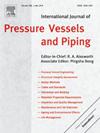改进了AISI 304L不锈钢在高温水中复杂硬化和软化材料性能的疲劳试验
IF 3.5
2区 工程技术
Q2 ENGINEERING, MECHANICAL
International Journal of Pressure Vessels and Piping
Pub Date : 2025-07-23
DOI:10.1016/j.ijpvp.2025.105612
引用次数: 0
摘要
对于多应变幅值的奥氏体不锈钢AISI 304L,用解析函数模拟了240℃高温下应变控制循环加载过程中的硬化、软化和二次硬化过程。然后,在240°C和70 bar的腐蚀性介质条件下(高温水)进行疲劳测试,复制材料的这种行为,在这种条件下,没有局部应变控制可以应用于试样而不会产生降低疲劳寿命的风险。因此,在确定材料疲劳寿命的实验执行中避免了保守的假设。结果表明,高温水环境下的应力幅值与空气环境下的应力幅值一致,并显示了所研究材料独特的硬化和软化行为。本文章由计算机程序翻译,如有差异,请以英文原文为准。
Improving fatigue testing of AISI 304L stainless steel in high temperature water regarding their complex hardening and softening material behaviour
For multiple strain amplitudes the complex material behaviour of the austenitic stainless steel AISI 304L has been modelled with an analytical function to replicate hardening, softening and secondary hardening during strain-controlled cyclic loading at the elevated temperature of 240 °C. This material behaviour was then replicated for fatigue testing in corrosive medium conditions (high temperature water) at 240 °C and 70 bar, where no local strain control could be applied to the specimen without incurring the risk of reduced fatigue life. Thus, avoiding conservative assumptions at the experimental execution determining the fatigue life of the material. The resulting stress amplitudes in high temperature water environment coincided to the stress amplitudes in ambient air and also demonstrated the distinctive hardening and softening behaviour of the investigated material.
求助全文
通过发布文献求助,成功后即可免费获取论文全文。
去求助
来源期刊
CiteScore
5.30
自引率
13.30%
发文量
208
审稿时长
17 months
期刊介绍:
Pressure vessel engineering technology is of importance in many branches of industry. This journal publishes the latest research results and related information on all its associated aspects, with particular emphasis on the structural integrity assessment, maintenance and life extension of pressurised process engineering plants.
The anticipated coverage of the International Journal of Pressure Vessels and Piping ranges from simple mass-produced pressure vessels to large custom-built vessels and tanks. Pressure vessels technology is a developing field, and contributions on the following topics will therefore be welcome:
• Pressure vessel engineering
• Structural integrity assessment
• Design methods
• Codes and standards
• Fabrication and welding
• Materials properties requirements
• Inspection and quality management
• Maintenance and life extension
• Ageing and environmental effects
• Life management
Of particular importance are papers covering aspects of significant practical application which could lead to major improvements in economy, reliability and useful life. While most accepted papers represent the results of original applied research, critical reviews of topical interest by world-leading experts will also appear from time to time.
International Journal of Pressure Vessels and Piping is indispensable reading for engineering professionals involved in the energy, petrochemicals, process plant, transport, aerospace and related industries; for manufacturers of pressure vessels and ancillary equipment; and for academics pursuing research in these areas.

 求助内容:
求助内容: 应助结果提醒方式:
应助结果提醒方式:


